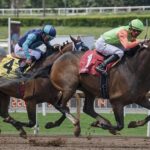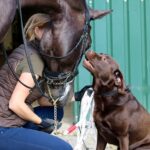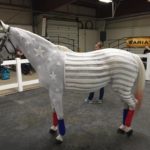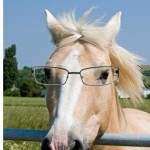No, we don’t think horses will be sporting fancy eye glasses (like the horse featured in this post) as a result of a study that’s gotten recent attention. Nor do we believe that the study, which found that two-thirds of horses have normal vision while the remainder of horses are either nearsighted or farsighted, will lead to much in the way of correcting horse vision in the near future. All “glasses” kidding aside, while we have the scientific and technical know-how to correct a horse’s vision, there’s currently a lack of demand for it. More on that later, but first a bit about the study. A team o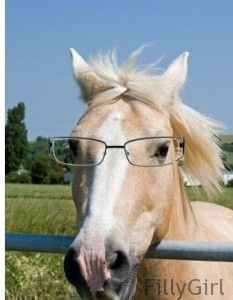 f of British researchers sought to assess the refractive state of a large, mixed-breed sample of horses and ponies in the United Kingdom. They performed streak retinoscopies (retina evaluations) on both eyes of 333 horses and ponies. They found that 68% of the horses had “perfect” vision (termed “emmetropia”) in both eyes, but the other 32% were either nearsighted or farsighted. Of those 32%, roughly half were near- while the other half were farsighted. Additionally, breed of horse/pony was the only factor that affected refractive state. Warmblood and draft horses (specifically Shires) tended to be more farsighted, whereas Thoroughbred crosses were more nearsighted. The researchers suggested that “this may be due to head shape and eye position in these breeds.”
f of British researchers sought to assess the refractive state of a large, mixed-breed sample of horses and ponies in the United Kingdom. They performed streak retinoscopies (retina evaluations) on both eyes of 333 horses and ponies. They found that 68% of the horses had “perfect” vision (termed “emmetropia”) in both eyes, but the other 32% were either nearsighted or farsighted. Of those 32%, roughly half were near- while the other half were farsighted. Additionally, breed of horse/pony was the only factor that affected refractive state. Warmblood and draft horses (specifically Shires) tended to be more farsighted, whereas Thoroughbred crosses were more nearsighted. The researchers suggested that “this may be due to head shape and eye position in these breeds.”
We already noted that horses’ eyes are unique in a past post, and many of us have read studies suggesting that horses see colors differently than humans do. But here is further empirical evidence that it wasn’t our horse’s natural talent that caused him to miss that last jump (or heaven forbid our own)! And it wasn’t the fault of that last favorite we bet on for getting disqualified for bumping in his last race! It was their terrible eye sight to blame! So what can we do about it? Should you be worried about your horse? Well first off, odds are in your favor on this one. Based on this study, there’s only a 33% chance that your horse even has a vision problem. Second, unless you’re using your horse to compete, I wouldn’t worry too much even if your horse does have a vision problem. If they’ve served you well thus far, why concern yourself? It’s not like they know the difference or are bothered by it, so why should you be? And lastly, if your horse is a competition horse, and your horse has a serious vision problem, you’d probably know about it by the lack of ribbons and trophies on your mantle. That’s not to say that a competition horse couldn’t become MORE competitive by getting some corrective vision. I mean theoretically, a horse that has real raw talent could be held back by poor vision. Or, a winning horse could develop vision problems later in life, but still have talent.
How can a horse develop vision problems later in life? Are we doing anything to contribute to future eyesight problems? Carol Hall, PhD, principle lecturer and reader in equitation science at Nottingham Trent University, in the UK was part of the Equine retinoscopic study. She said, weanling foals kept in tight surroundings (such as stalls and small paddocks/pastures) might not develop the full capacity of their vision if they don’t “practice” seeing things that are far away. The visual system will adapt to what is required of it, so visual experiences at as many different distances as possible will help improve vision.” Does this give us one more reason to turn out our horses (even when we think it’s too cold)? Besides the fresh air, social interaction with their buddies, and natural light, does turning out our horses help prevent them from losing their vision? Too much time inside their stables (some without great lighting) as a cause of vision loss actually makes sense. I mean everyone has been told at least once not to read in the dark right? And everyone who stares at a computer screen for a living knows what that does to human eyes. Maybe it’s not so different for a horse staring at the walls of their stable for too many hours.
If we can test a horse’s vision and determine its refractive error, why can’t we fix/correct that refractive error? No, horses don’t need to read from that eye chart like we do at the eye doctor’s office (though a horse in a vet’s office, looking at an eye chart, with a caption that says “better one or two” would make a great cartoon strip)! We already have machines that can take the horse’s measurements. We just need someone brave enough to invent corrective eye wear for horses. Corrective goggles for horses to wear around their 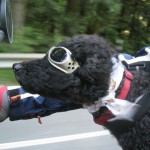 heads like those dogs that ride on motorcycles! Race horses could have problems with mud, but most other event horses should be fine. So what’s the problem? Well it all comes down to economics which are dictated by supply and demand. The machines needed to test a horse’s vision aren’t widely available because of a lack of demand. There’s no demand because: One, as we already mentioned, the majority of horses out there do not have vision problems. Two, the majority of domesticated horses are not used in competitions and therefore don’t need perfect vision. And three, of the horses used in competition, only a fraction of them compete on a professional level where it would make economic sense to invest in correcting a horse’s vision. The average Pony Club mom isn’t going to spend the money on a refractive eye test for their kid’s pony (and we don’t blame them given how much it already costs to own a pony). So that leaves the professionals. And rightly or wrongly, I hate to say it, but the professionals are just too competitive. It’s too easy to replace a horse with bad vision for another that will give them a better chance of winning a gold in Tokyo (assuming Equestrian Events are not eliminated from the 2020 Summer Olympics) or winning first prize at the next Grand Prix. These professionals train their whole lives, depend on the sport for their incomes, and their sponsors have too much riding (no pun intended) on the outcomes to risk it all on a horse known to have bad vision. They’d rather switch up the horse, like a tennis player switching tennis rackets. It’s wrong, but it’s more about business at that level of competitive horse riding. So for now, the machines needed to refract a horse’s eyes remain too expensive, too uncommon, and unlikely to be seen in your vet’s truck any time soon. I do wonder though…how much would Nike pay to sponsor a horse wearing goggles with “Nike” written across the strap? Pride aside, it might just be worth coming in last place!
heads like those dogs that ride on motorcycles! Race horses could have problems with mud, but most other event horses should be fine. So what’s the problem? Well it all comes down to economics which are dictated by supply and demand. The machines needed to test a horse’s vision aren’t widely available because of a lack of demand. There’s no demand because: One, as we already mentioned, the majority of horses out there do not have vision problems. Two, the majority of domesticated horses are not used in competitions and therefore don’t need perfect vision. And three, of the horses used in competition, only a fraction of them compete on a professional level where it would make economic sense to invest in correcting a horse’s vision. The average Pony Club mom isn’t going to spend the money on a refractive eye test for their kid’s pony (and we don’t blame them given how much it already costs to own a pony). So that leaves the professionals. And rightly or wrongly, I hate to say it, but the professionals are just too competitive. It’s too easy to replace a horse with bad vision for another that will give them a better chance of winning a gold in Tokyo (assuming Equestrian Events are not eliminated from the 2020 Summer Olympics) or winning first prize at the next Grand Prix. These professionals train their whole lives, depend on the sport for their incomes, and their sponsors have too much riding (no pun intended) on the outcomes to risk it all on a horse known to have bad vision. They’d rather switch up the horse, like a tennis player switching tennis rackets. It’s wrong, but it’s more about business at that level of competitive horse riding. So for now, the machines needed to refract a horse’s eyes remain too expensive, too uncommon, and unlikely to be seen in your vet’s truck any time soon. I do wonder though…how much would Nike pay to sponsor a horse wearing goggles with “Nike” written across the strap? Pride aside, it might just be worth coming in last place!
